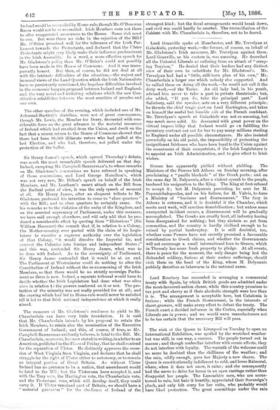Lord Granville spoke at Manchester, and Mr. Trevelyan at Galashiels,
yesterday week,—the former, of course, on behalf of Mr. Gladstone's Irish measures, Mr. Trevelyan against them. Lord Granville, as his custom is, was amusing. He described all the Unionist Liberals as suffering from an attack of "creep- ing Toryism." He denied that their leaders had any distinct view of their own to substitute for Mr. Gladstone's. Mr. Trevelyan had had a " little, still-born plan of his own," Mr. Chamberlain a larger one which nobody else supported. And he rallied them on doing all the work,—he would not call it the dirty work,—of the Tories. An old lady had, in his youth, advised him never to take a part in private theatricals ; but, she added, " If you do, take the principal part." Lord Salisbury, said the speaker, acts on a very different principle ; he thrusts the ehief tragic part on Lord Hartington, and takes on himself the useful but humble role of the French confidant. Mr. Trevelyan's speech at Galashiels was not so amusing, but was meth more solid. He descanted with great power on the virtual imposs bility that Ireland would go cn fulfilling the pecuniary contract cut out for her to pay many millions sterling to -England under all possible circumstances. He also insisted powerfully on his old point, the impossibility of protecting the insignificant Irishmen who have been loyal to the Union against the resentment of their compatriots, if the Irish Legislature is to appoint an Irish Administration, and to give effect to Irish wishes.


































 Previous page
Previous page